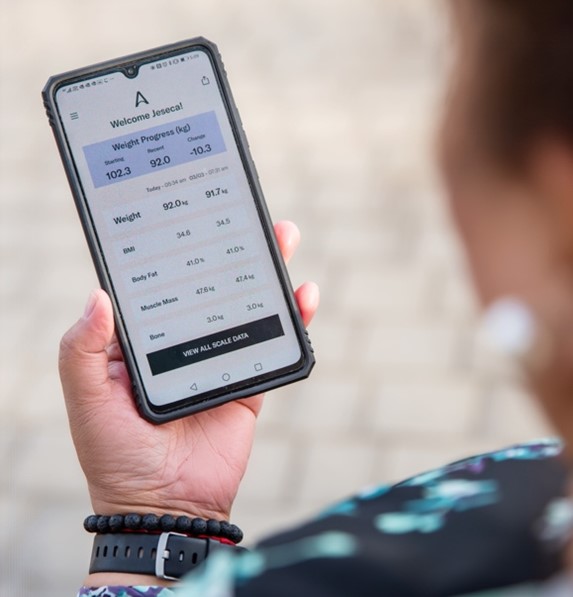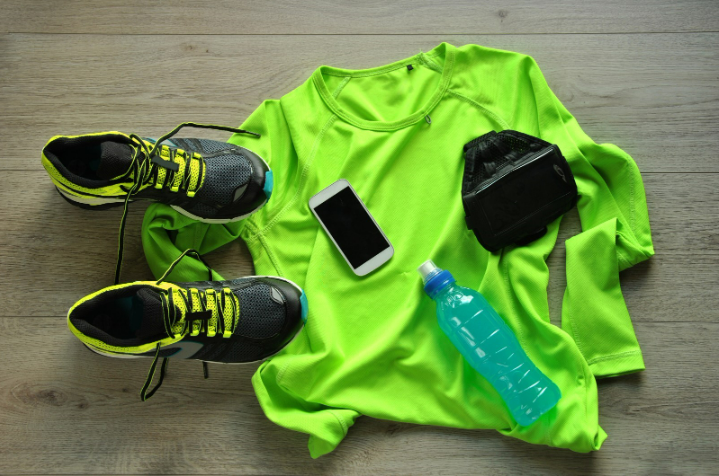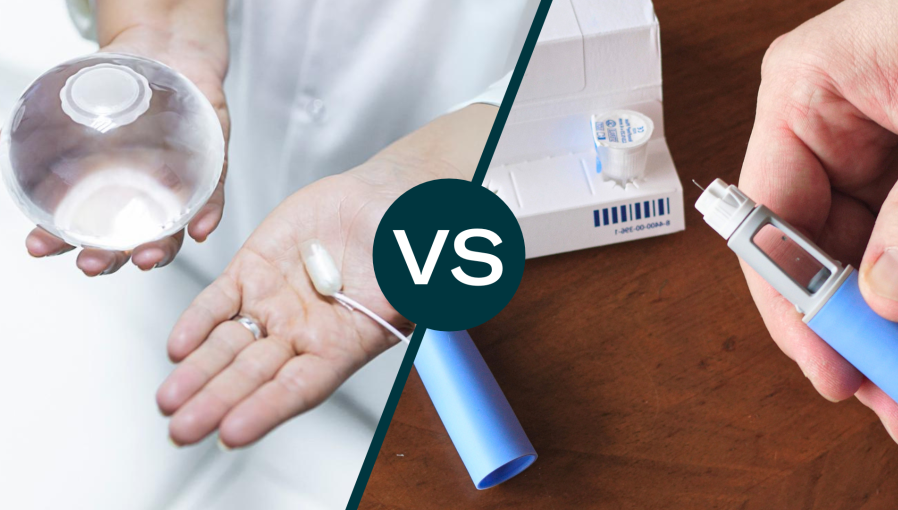How To Keep Weight Off After Losing It

5 weight loss tips to help you keep the weight off
Weight loss can be a journey with many ups and downs. This is especially true for people who buy into the hype of crash diets or other weight loss fads. They often see some impressive results in the beginning, but then, once the diet is over, fall back into unhealthy habits only to watch their weight climb right back up to where it was before.
Simply put, these weight loss gimmicks don’t work. They force people to alter their habits rapidly or drastically, all without addressing the root problem of establishing new, healthier habits that spark positive lifestyle change. This is why most research suggests that people take a holistic lifestyle change approach with regard to their weight-loss journey—even when undergoing medical or surgical treatments—versus relying solely on any single weight loss tactic in isolation.
This is precisely what makes the Allurion Programme different. We understand that weight loss isn’t easy and, for many, can be a source of anxiety and frustration, too. The programme combines our unique swallowable gastric balloon with a supported lifestyle change programme to achieve significantly greater results than if they relied on a lifestyle change programme alone.1 This has been the key to our success in helping more than 80,000 people in over 50 countries lose weight and change their habits over the long term.
It’s important to keep in mind that a temporary balloon doesn’t equate to temporary weight loss. Quite to the contrary, we’ve seen that people who participate in the Allurion Programme lose an average of 10-15% of their total body weight.2 Even more, our research has shown that 95% of average weight loss can be successfully sustained one year after the balloon exits the body.3 At the end of the day, keeping the weight off truly comes down to making lifestyle changes that you can actually stick to. In this article, we’ll explore the philosophy of weight loss motivation and provide some useful (and simple) tips on how to keep weight off after losing it.
Why do people regain weight?
The reason why crash diets and other weight loss fads tend to fail in the long run is that they’re focused more on reaching an end result than on building new habits along the weight loss journey. In many cases, diets force people to make snap lifestyle changes that can oftentimes feel as though they are being deprived of something.

While the promise of rapid weight loss might be enough of a goal for people to endure this kind of deprivation over a short period of time, removing an unhealthy habit momentarily without replacing it with a healthier habit is a recipe for failure.
Once a diet is over, it’s all too easy to add everything you’ve eliminated from your lifestyle back into the mix once again. There are also a few other reasons why people regain weight post-diet worth mentioning:
- Setting unrealistic goals: Starting a weight loss journey means committing to change over the long term, with smaller goals dotted along that journey. For example, while your ultimate end goal might be to lose 50-100lbs, setting your sights on that big number alone right out the gate will likely feel daunting—and over time, the more daunting it feels, the less likely you’re going to remain committed to achieving it.
- Succumbing to restrictive diets: Many diets force people to abstain temporarily from indulging in the things they love without teaching them how to replace those things with healthier and more sustainable options. This creates a whiplash effect of sorts once the pre-set diet period is over where people all too often find themselves falling back into their original, unhealthy habits—the things that contributed to their weight gain in the first place. This is because restrictive diets focus uniquely on deprivation. And let’s face it, no one likes to feel deprived.
- Isolating fad weight-loss tactics: Sustainable weight loss requires making universal lifestyle changes, not just introducing a diet into your world and then letting all other unhealthy habits run wild in a “business as usual” way. For instance, if you commit to a crash diet that aims to reduce your carb intake significantly but then don’t increase your physical activity, water consumption, and so on at the same time, you’ve essentially isolated your diet from the rest of your life. You’ve got to be committed to making positive changes in all aspects of your life to see a real difference.
- Falling prey to an unhealthy mindset: This can take on many forms. But if you start your weight loss journey from a place of negativity as opposed to seeing it as an opportunity to weave positive health and lifestyle changes into your life, it’s easy to become your own worst enemy. Making the conscious decision to lose weight is a big step all on its own. Being your own biggest cheerleader is the motivation you need to succeed.
How do you maintain weight loss?
For starters, it’s important to keep in mind that everyone is different. One person’s weight loss journey will likely be dramatically different than another person’s. That can be due to genetics, underlying health issues, lifestyle choices, and the list goes on. However, there are a few general best practices worth applying to virtually everyone for how to keep weight off after losing it.
1. Track your progress
Weight loss is the result of multiple factors. As you begin your weight loss journey, you’ll want to keep tabs on what you eat, your activity levels (including exercise), and how well you’re sleeping as well as the evolution of your weight and body fat composition over time.
Among the many benefits associated with tracking the progress of your weight loss journey, keeping yourself accountable and staying motivated are at the top of the list. The more you document, the more you can see how your body changes little by little, and how even the smallest changes—like swapping food choices—can have a huge impact.

Many people like to keep a journal to track their weight and activity levels. We recommend using the Allurion app (iOS and Android) as it’s the perfect companion to the Allurion weight loss programme and also syncs seamlessly with the Allurion Connected Scale and Health Tracker. Plus, you can share your data with the Allurion clinic team, so they can provide you with personalized support throughout your weight loss journey.
2. Get outside support
You shouldn’t feel like it’s you against the world when it comes to losing weight. In all honesty, it’s a team effort. You’ll want to lean on your friends, family, fitness coaches, and health professionals—including the team at Allurion—to cheer you on to succeed. Having a solid support network is the key to both achieving your goals and overcoming whatever challenges you might face along the way.

This is one of the things that makes the Allurion Programme so unique. We are committed to supporting you every step of the way, ensuring that you learn how to make important lifestyle changes to achieve weight loss and healthier habits that’ll keep the weight off in the long run.
3. Set realistic, action-oriented goals
To reiterate, one of the biggest reasons why people regain weight after a diet is because they haven’t taken the time to set action-oriented goals. Unlike outcome-centric goals that are laser-focused on the end result, action-oriented goals double down on shorter-term actions, lend themselves to repetition, and, as a result, are more likely to become habitual.
For example, you might start the Allurion Programme with the ultimate goal of losing 30lbs over the course of six months. But that’s just the final outcome. In order to reach that goal, you need to break up your weight loss journey into a series of smaller actions that essentially create a day-to-day roadmap for getting you to your final destination.

Instead of loosely telling yourself, “I’ll go for a few runs this week,” be more specific in your goal setting by committing to a 20-minute run in your neighborhood on Monday, Tuesday, and Thursday before work. Take that a step further by laying out your workout clothes and running shoes before going to bed to make your early morning wake-up call a little less daunting. Then, as you get more accustomed to your new routine and continue making progress in the programme, be sure to set new goals around increasing either the time or the frequency of your runs.
These action-oriented goals aren’t specific to exercise either. You can choose to swap in a piece of fresh fruit whenever you get a craving or as a replacement for your mid-afternoon snack. It’s really all about making conscious, incremental changes to improve your health and wellbeing.
4. Eat a well-balanced diet (including the food you enjoy)
This goes hand-in-hand with setting realistic goals. Making drastic changes all at once is not going to help with losing weight and keeping the weight off because your body (and mind) will feel like they’re being deprived. However, by introducing new and healthier habits into your daily life one at a time, you can make these your “new norm” well after your weight loss programme is done.
A big part of this includes eating in a well-balanced way. What do we mean by this? Be sure to weave fruits and vegetables, unsaturated fats, fiber, and protein into your diet. And don’t forget to drink plenty of fluid throughout the day. A great meal, that just so happens to be really easy to make, is grilled chicken breast, steamed carrots, broccoli, and a side of quinoa. It might sound plain, but it’s surprisingly delicious and quite filling, too.

Remember, eating right is just as much about what you put into your body as it is about how much you consume. As a general rule, if you start to feel physically full, stop eating. Your weight loss journey is about learning what your body actually needs to stay healthy and setting limits.
Now, it’s important to note that everyone is a bit different and, in most cases, will have various health and dietary needs to adhere to. So, be sure to speak to your doctor, a health professional, or a nutritionist to identify what a well-balanced diet looks like for you. And keep in mind that a big perk of the Allurion Programme is the access you’ll get to nutritional coaches and other valuable resources to help you create new and healthy habits.
5. Do exercise you actually enjoy
Many people try to force themselves to do some kind of activity—whether it was recommended to them by friends and family or if it just so happens to be the latest fitness trend of the moment—but if you don’t enjoy the exercise you’re doing, it’ll be hard to stick to it.
When people ask us, “How do you maintain weight loss?” our answer is quite simply: Keep moving. In fact, it has been found that physical activity may be the single best predictor of who keeps weight off versus who doesn’t— a major factor in weight loss maintenance.4
Remember, exercise can take the form of many different types of physical activities. For some, traditional activities like running, swimming, and low-impact aerobics do the trick. For others, dance classes, yoga, or taking long walks (at a steady pace) are a better fit. When it comes to how to keep weight off, doing exercise you actually enjoy makes a huge difference.

In more practical terms, the World Health Organization (WHO) recommends that adults do at least 150 minutes of moderate-intensity aerobic activity a week (roughly 30 minutes per day) or 75 minutes of vigorous activity per week. To keep weight off after losing it, more specifically, studies have shown that increasing aerobic activity beyond the WHO’s recommended 30 minutes per day—to 45-60 minutes per day—may help to prevent weight gain as well.5
Maintain the right mindset
As you can probably tell by now, weight loss is a matter of both the body and the mind. You might even say that there’s a psychology to weight loss motivation. But what exactly do we mean by this? Simply put, when you make the conscious decision to begin a weight loss journey, you are essentially setting an intention to make a positive change in your life.
This can have a trickle-down effect on the goals you set, the new habits you create, and so on. In other words, setting an intention right out the gate is a perfect strategy for weight loss motivation because it has the power to change habits and behaviors that, when replicated over and over again, become the key to successfully keeping weight off after losing it.
The good news is: If you’ve decided it’s time to lose weight, you’ve started to harness the power of weight loss motivation. Now, it’s just a matter of setting realistic goals—and testing strategies that work for you—to get you there.
How to get back on track with weight loss
We often call losing weight a “weight loss journey” because, as with every journey, sometimes there are ups and downs or peaks and valleys. That is perfectly normal. At the end of the day, we’re all human and, for better or worse, we sometimes deviate from our best-laid plans. However, a small slip-up doesn’t have to throw your entire weight loss journey off track, nor should it give you a reason to give up altogether and fall back into your old habits.
If anything, it should be your motivation for how to get back on track with weight loss. As a starting point, recommit to your goals and feel free to modify them to make them more achievable in the near term. And if you’re struggling, reach out to your support system for help. Often what we need most after slipping up is knowing that there are others cheering us on.
We understand, a weight loss journey is not always easy and, at times, can feel downright overwhelming, especially after a slip-up. But remember to approach even the toughest days with compassion—for yourself and your health—because the end result is worth it.
Increase your motivation for weight loss with the Allurion Programme
Unlike other weight loss programmes, the Allurion Programme was designed to not only help people achieve weight loss goals over a six-month period but also give them the tools and resources to learn how to keep weight off after losing it—well after the gastric balloon has left their system.
The Allurion Programme is more than just a balloon. In fact, it’s an innovative way to empower people to achieve weight loss goals and build lifelong healthy habits.
This has been the key to success in helping people lose, on average, 10-15% of their total body weight. Plus, people participating in the Allurion Programme get access to ongoing nutritional coaching and lifestyle support, the included Allurion Connected Scale and Health Tracker Watch, and the Allurion app—that not only tracks progress but also helps maintain healthy habits.
So, if you’re ready to embrace your weight loss goals and find a more promising and reliable way to keep the weight off for good, look no further than the Allurion Programme today.
Ready to kickstart your weight loss journey into high gear?
Book a free gastric balloon consultation today!
Before booking, be sure to check your eligibility using our BMI calculator.
References:
1. Results at 16 weeks. Raftopoulos, I et al Holyoke Medical Center. Holyoke, MA An Intensive 52 Week Nutritional, Exercise and Behavior Modification Programme: Comparing With or Without the Allurion IGB Presented at ASMBS 2019
2. Ienca et al. Obes Surg. 2020, Apr. 30, pgs 3354–3362
3. Vantanasiri et al. Obes Surg 2020, Apr. 30, pgs 3341–3346
4. Penedo FJ, Dahn JR. (2005). Exercise and well-being: A review of mental and physical health benefits associated with physical activity. Curr Opin Psychiatry.18(2):189-193.
5.Goldberg JH, King AC. Physical activity and weight management across the lifespan. Annu. Rev. Public Health. 2007 Apr 21;28:145-70.



